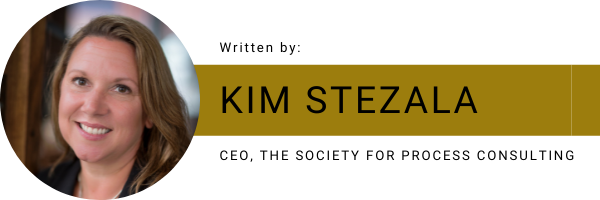 As process consultants, we are often in the middle of significant transformation within organizations. Change is difficult. We know this…but what can we do to make it less difficult and more engaging for the people contributing to the process?
As process consultants, we are often in the middle of significant transformation within organizations. Change is difficult. We know this…but what can we do to make it less difficult and more engaging for the people contributing to the process?
This month, I interviewed Society member and Certified Process ConsultantTM Kristin Evenson of Junctures.net, a consultant and coach specializing in a brain-based approach. The audio of the interview is below the post. Kristin is also co-host of the Third Turn podcast.
Kristin made the connection between neuroscience and consulting through professional and personal experience. For instance, when strategic change was needed in an organization, conflict would often emerge and it would be unsettling for team members to navigate. In a personal example, when faced with life decisions her “soul would be super-engaged” but her brain would go into alarm mode.
Why does this happen? Because the brain is inherently resistant to change and it distinguishes between a threat or a reward in 1/5 of a second…and the brain is predisposed to make negative judgments as a mode of self-preservation. The impact of threat/reward interpretations is significant: Situations we approach as “reward” engage and enliven our thinking, helping enhance our creative thinking and collaborative abilities; situations we interpret as “threat” literally shrink our mental capacity--specifically our ability to think creatively and collaboratively.
Kristin studied neuro-based coaching at the NeuroLeadership Institute (NLI). Based on extensive research, NLI recognized five specific social threats common to people in a change process. The acronym SCARF® represents the five perceived threats to a person’s sense of:
S = status
C = certainty
A = autonomy
R = relatedness
F = fairness
If you have ever been in a meeting and you feel uncomfortable, and you are not sure why, you might be subconsciously interpreting a social threat. Kristin said that as consultants, by being aware of social threats we can proactively facilitate opportunities for people to more easily interpret or reframe situations as a reward, rather than a threat.

Any of the SCARF threats or combination of them puts us on the defense naturally. It could be something from a person’s personal history that can suddenly trigger them, especially if they have been othered or treated unfairly in the past. If we as facilitators can help people reframe these threats, or at least name them, it eases the discomfort. Pausing to acknowledge tension and emotions can calm down the limbic system and help teams to re-group.
Kristin said, “What is so great about process consulting is it allows choices and options and people are co-creating solutions together. By handling the threats, you can increase brain capacity for thinking creatively and courageously.”
Three steps to learn more:
- Listen to the 15-minute interview at the link below to get advice on how to reverse the threats.
- Connect with Kristin at Junctures.net and Third Turn Podcast.
- Take a SCARF assessment at the NeuroLeadership Institute. We all have a distinctive SCARF profile, which helps us recognize the threats we’re personally most prone to or triggered by. As consultants and facilitators, knowing your own SCARF profile can be helpful as you engage in difficult situations and help others navigate change in positive, collaborative, creative ways.
Listen to my conversation with Kristin here.
- Kim Stezala
